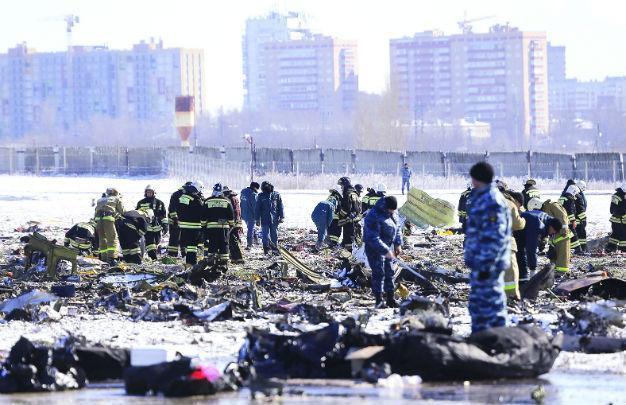Aviation experts examine black boxes from Russian plane crash site
ROSTOV-ON-DON, Russia – The Associated Press

REUTERS photo
Aviation experts on March 20 began examining the black boxes from the FlyDubai flight that crashed amid high winds at an airport in southern Russia, while emergency workers finished combing the debris-laden runway.
FlyDubai’s Boeing 737-800 from Dubai nosedived and exploded in a giant fireball before dawn March 19 after trying to land for a second time in strong winds in the Russian city of Rostov-on-Don.
FlyDubai confirmed all 62 people, including seven crew members, on the plane were killed. Most of the passengers were Russian.
Several planes had trouble landing at the airport at the time of the crash, with one trying to land three times before giving up and diverting to another airport, experts said.
Sergei Zaiko, deputy chairman of the Inter-State Aviation Committee, told Russia’s Channel One that experts on March 20 were looking at the plane’s cockpit voice and flight data recorders, which were delivered to Moscow earlier in the day.
They will be viewed by experts from Russia, the United Arab Emirates, France and the U.S., since the American-made Boeing plane had French-made engines.
The flight recorders from the jet are badly damaged and could take up to a month to decode, Russia’s airline regulator said on March 20.
“The received recorders are badly damaged mechanically,” Russia’s Interstate Aviation Committee (IAC) said in a statement on its website, alongside a photo of a crumpled recorder, Reuters reported.
“Specialists ... have started the inspection, opening and removing the memory modules from their protective coverings for further work to restore the cable connections and prepare to copy the data,” the IAC said.
Flydubai’s CEO Ghaith al-Ghaith said at a news conference in Dubai on March: “We have high confidence in the Russian authorities who are capable of managing local conditions for flights,” he was quoted as saying by Reuters. “We fully trust the Russian authorities in this.”
Al-Ghaith said: “The airport was open. It was good enough to operate and good enough to land, as per the authorities.”
“The weather conditions were good enough for the flight.”
At Rostov-on-Don, hundreds of people flocked March 20 to the airport, the region’s largest, to lay flowers and leave candles and toys in memory of the dead. The city is 950 kilometers south of Moscow near the Ukrainian border.
State-owned Rossiya-24 on March 20 interviewed a woman living nearby who said she was woken up by the sound of the explosion.
“The housed started shaking. I looked out of the window: the sky was red and in a few seconds it was over,” said the woman, whom Rossiya did not identify.
Closed-circuit TV footage showed the plane going down at a steep angle and exploding. The powerful explosion left a big crater in the runway and pulverized the plane and passengers’ remains.
Transport Minister Maxim Sokolov told reporters that emergency teams had finished combing the area and that authorities were now waiting for investigators to give the green light to let repair teams onto runway. Sokolov said he expects the airport to open early March 21.
Some of the victims were from rebel-held areas in eastern Ukraine where fighting between Russian-backed separatists and Ukrainian government troops has killed more than 9,100 people since April 2014. The war has turned the region’s main airport of Donetsk into a wasteland, and many locals have been using the airport in Rostov across the border.
